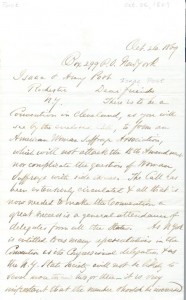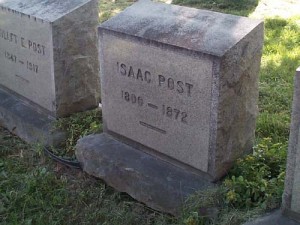Born February 26, 1798
Birthplace Westbury, NY
Died April 1872
Grave Site Mt. Hope Cemetery, Rochester, NY
Contribution Reformer and anti-slavery activist
Isaac Post was born in Westbury (Long Island), New York, on February 26, 1798. His parents were Edmund and Catherine Willets Post, a farming family and members of the Society of Friends (Quakers).
Post married Hannah Kirby in Long Island in the early 1820s. Their daughter, Mary H. Post, was born in Westbury (Long Island), New York on February 20, 1823. The same year, Post, with his wife and daughter, moved to Southern Cayuga County in New York, and he took up farming. A short time later, the Posts had a second child, a son, who died before he reached adulthood.
In 1827, Hannah Kirby Post died. During her illness, Amy Kirby, her sister, nursed her and took care of the children. After Hannah’s death, Amy stayed on. The same year, the Society of Friends experienced a contentious split between the Orthodox faction of the religion and those who became known as Hicksites. Post became a Hicksite Quaker.
Post married Amy Kirby a little over a year after his wife’s death. The couple had three sons: Jacob Kirby, born in 1829, Joseph W., born in 1832, and Willett E., born in 1847. Their daughter, Matilda, born in 1840, did not survive to adulthood.
In 1836, the Posts moved to Rochester, where they settled in a house at 36 Sophia Street (later North Plymouth Avenue). In 1839, Post established a drug store. The firm of Post, Coleman and Willis was located in the Smith Arcade on Exchange Street.
In the early 1840s, the Posts and other Rochester Quaker reformers began to hold small abolitionist meetings in their homes. It was during this period that Post became involved with anti-slavery activities. His home was to become a frequent meeting place and refuge for reform lecturers, including William Lloyd Garrison, Frederick Douglass, Parker Pillsbury, Susan B. Anthony, and Sojourner Truth.
In 1842, Post served as an officer in the newly-established Western New York Anti-Slavery Society (WNYASS), an organization which he had helped to found. He also became a close friend to Frederick Douglass. Later in the decade, after Douglass moved to Rochester, Post worked closely with him in efforts to assist fugitive slaves on their way to Canada. The Post home was an active station on the Underground Railroad, sometimes housing between ten and twenty refugees in one night.
 Post supported Douglass’s newspaper, the North Star, and Post’s son, Joseph, worked for Douglass for a time at the newspaper. Post also endorsed Douglass in his many attempts to open the Rochester community to equal civic and social participation by African-Americans. And, when Douglass became implicated in John Brown’s raid on Harper’s Ferry in 1857, the Posts helped Douglass to flee the country in order to avoid possible arrest and prosecution.
Post supported Douglass’s newspaper, the North Star, and Post’s son, Joseph, worked for Douglass for a time at the newspaper. Post also endorsed Douglass in his many attempts to open the Rochester community to equal civic and social participation by African-Americans. And, when Douglass became implicated in John Brown’s raid on Harper’s Ferry in 1857, the Posts helped Douglass to flee the country in order to avoid possible arrest and prosecution.
By the mid-1840s, although Quakers believed that slavery was evil, many ministers and elders looked with disfavor upon radical anti-slavery activities such as those in which Post engaged. Post, in turn, believed that the elders had no right to judge individual Friends in matters of conscience. Post refused to give up his anti-slavery work, and he, along with is wife, left the Society of Friends.
The Posts were not alone in their abdication. Many of their fellow Quaker anti-slavery advocates in the Rochester area left the Friends for the same reason. Ida Husted Harper, biographer of Susan B. Anthony, notes that during the late 1840s and early 1850s, the Anthonys, whose “homestead” was “a favorite meeting place,” had regular Sunday meetings, each of which were “equal to a convention.” She wrote,
Here were gathered many times the Posts, Hallowells, DeGarmos, Willises, Burtises, Kedzies, Fishes, Curtises, Stebbins, Asa Anthonys, all Quakers who had left the society on account of their anti-slavery principles and were leaders in the abolition and woman’s rights movements.
Post was also involved in Spiritualism. He was one of the earliest supporters of Kate and Margaret Fox, sisters who had heard strange “rappings” in their house in Hydesville, New York, which they had interpreted as messages from the dead. In 1848, Post was among an original small group which met weekly in order to communicate with the dead, using the Fox sisters as mediums. He remained a mentor and a staunch supporter of the sisters even in the face of crowd hostility during their exhibitions and the ridicule of newspapers. Eventually, Post became a recognized medium himself. In 1852, he published a book, Voices From the Spirit World, Being Communications From Many Spirits, which claimed to include the “writings” of the spirits of Benjamin Franklin, George Fox, Elias Hicks, Voltaire and William Penn among others. The book was widely derided, and Post’s beliefs caused fellow abolitionist Lucretia Mott some concern on his behalf. She wrote that although she was “much interested” in “the Subject” of “Spiritual manifestations,” and that it should not “be treated with ridicule or as wilful deception,” it required “more faith than” she “could command.” She felt compelled to ask,
“Is there not reason to fear the effects of such frequent reveries, on Isaac Post’s mind? A Mrs. Taft of Mass. has lately become quite insane, from that cause.”
In spite of Mott’s worries, Post retained his sanity. He and his wife also retained their belief in Spiritualism.
 In addition to abolitionism and Spiritualism, Post was an early supporter of women’s rights. He is known to have attended women’s rights conventions. In 1853, he signed “The Just and Equal Rights of Women,” a call and resolutions for the Woman’s Rights State Convention held in Rochester, New York on November 30 and December 1, 1853.
In addition to abolitionism and Spiritualism, Post was an early supporter of women’s rights. He is known to have attended women’s rights conventions. In 1853, he signed “The Just and Equal Rights of Women,” a call and resolutions for the Woman’s Rights State Convention held in Rochester, New York on November 30 and December 1, 1853.
Although Post had abandoned his membership in the Society of Friends in the 1840s, he retained his Quaker belief in the peace testimony, and opposed the Civil War as a means to achieve the abolition of slavery. He did, however live to see slavery abolished as a result of that war. He died in April of 1872.
Bibliography of Suggested Books & Articles
- Anthony, Susan B., et al., History of Woman Suffrage, Rochester, NY: Charles Mann, 1889, v.1, pg. 578.
- Frank, Meryl and Blake McKelvey, “Some Former Rochesterians of National Distinction,” Rochester History, v. XXI, no. 3, July 1959. (Short bio)
- Garraty, John A. and Mark C. Carnes, eds., American National Biography, NY: Oxford Univ. Press, 1999 (biography of Amy Post, by Nancy Hewitt) (ANB)
- Harper, Ida Husted, The Life and Work of Susan B. Anthony, Indianapolis & Kansas City: Bowen-Merrill Co., 1898, v. 1.
- Hewitt, Nancy, Women’s Activism and Social Change, Rochester, New York, 1822-1872, Ithaca: Cornell University Press, 1984.
- Isaac and Amy Post: Early Rochester Activists, Rochester, NY: sn, 1985 (VHS videocassette, Rochester Public Library)
- McFeely, William S., Frederick Douglass, New York: WW Norton & Co., 1991.
- McKelvey, Blake, “Civic Medals Awarded Posthumously,” Rochester History, v. XXII, no. 2 (April 1960).
- McKelvey, Blake, “Susan B. Anthony,” Rochester History v. VII, no. 2 (April 1945)
- McKelvey, Blake, “Woman’s Rights in Rochester: A Century of Progress,” Rochester History, v. X, Nos. 2 & 3 (July 1948).
Bibliography of Suggested Web Sites